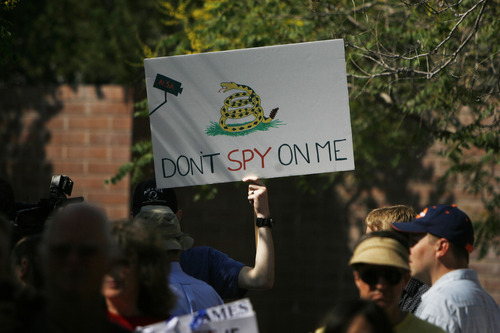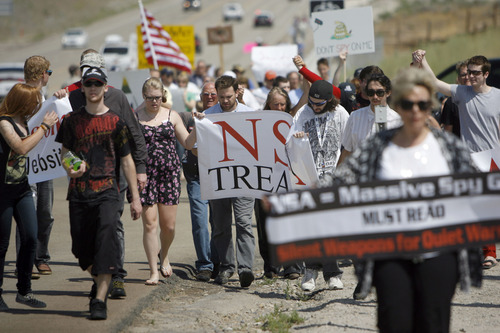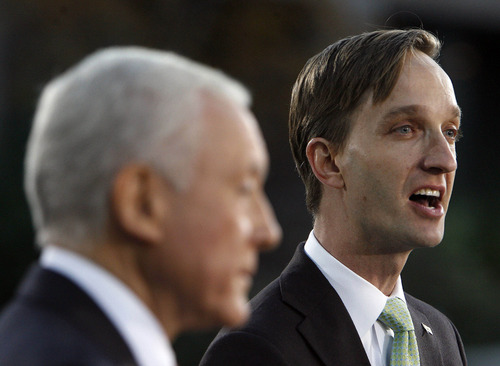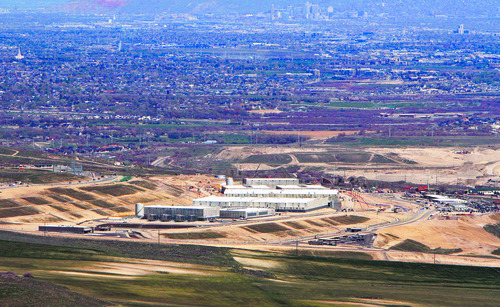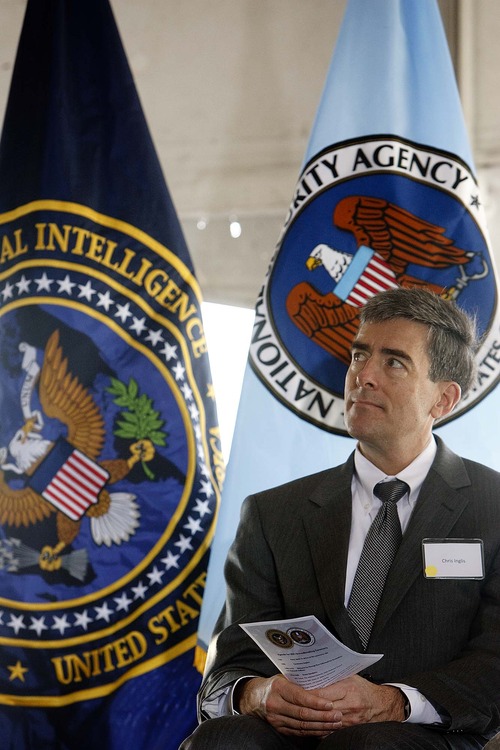This is an archived article that was published on sltrib.com in 2013, and information in the article may be outdated. It is provided only for personal research purposes and may not be reprinted.
Washington • The National Security Agency and the FBI monitored the content of all email and text messages in the Salt Lake City area during the time of the 2002 Winter Olympics, according to a new report.
The Wall Street Journal cited unnamed "officials," in reporting Wednesday that the NSA and FBI worked with Qwest Communications for a period of less than six months around the time of the Games to intercept communications in the region.
Key Utah officials involved with the Games said they were unaware of such a program, though they could have been left out of the loop on such a high-level secret effort.
Former Sen. Bob Bennett, R-Utah, said he didn't know any "details" regarding that specific surveillance but noted a strong presence of intelligence officials before, during and after the Olympics.
"It would shock me if they were not" snatching up communications, Bennett said. "If they were not intercepting text messages then they were not doing their jobs at the center of world attention. Sure they were. I just assumed that they were."
The Games, which came five months after the Sept. 11, 2001, terrorist attacks, brought a massive security presence to Utah, headquartered in a downtown Salt Lake City building. Just two floors up from that command center was a floor filled with officials from the U.S. Intelligence community and from various American allies.
What went on there, though, was a secret to even some of the top Olympic leaders.
—
Out of the loop • Fraser Bullock, who was the Salt Lake Organizing Committee's chief operating officer through the 2002 Winter Games, said Wednesday that he "was not aware of any electronic surveillance activities for the 2002 Olympic Games."
That said, Bullock noted that even with heightened security concerns, there were no major incidents.
Security officials "had one thing in mind — keep people safe, including the athletes, dignitaries from all over the world, the 1.8 million spectators, the volunteers and workers," Bullock said. "They not only succeeded in that objective, but they also did it in a reasonably unobtrusive manner to keep the focus on the Games."
Dave Tubbs, who retired from the FBI in 2000 to be the executive director of the state's Utah Olympic Public Safety Command, said if the NSA gathered any useful intelligence from emails and text messages, it was never shared with him. Tubbs said he was unaware of such collection programs.
"Even though I still had a top secret [clearance], I guess there was nothing I needed to know," Tubbs said.
Salt Lake City Police Chief Chris Burbank, who was the department's liaison to the Secret Service and a venue commander for Olympic Square, said a lot of intelligence was gathered to safeguard the Olympics, but federal officials never gave any indications of collecting communications.
"I sat in lots and lots of meeting and nobody ever said we're checking people's emails and here's what we found out," Burbank said.
Lane Beattie, the state's chief liaison to the Olympics, also held a security clearance during the Games but he says he never heard anything about this type of a program.
—
Need to know • "I never had a meeting where anyone intimated to me that they were doing this," Beattie said Wednesday. "We were in a need-to-know basis. That subject never came up."
A Cabinet-level technical adviser to then-Gov. Mike Leavitt also said he wasn't aware of the monitoring effort during the 2002 Games.
State officials were deeply involved in fortifying and securing Utah's law-enforcement communications systems in connection with the Olympics, including installation of a powerful police radio grid and maintaining a network of personal pagers for federal, state and local officers at the Games. But the feds shared nothing about a massive surveillance effort of emails and texts.
''They didn't come to us and tell us they were doing it,'' said Phil Windley, who was Utah's chief information officer for two years and a senior member of Leavitt's staff. ''It's not clear they told anybody about it. The NSA probably just did it.''
A Tribune request for comment from the FBI was not immediately returned. An NSA spokeswoman declined to comment. CenturyLink, the Louisiana-based telecommunications giant that acquired Qwest in 2010, also declined comment.
''We do not have any information on this topic,'' said spokesman Mark Molzen.
Since former NSA Edward Snowden contractor began leaking classified documents about domestic spying, Americans have learned that the agency's efforts were more broad than previously thought. The Journal, in its Wednesday edition, noted that the spy shop was able to intercept nearly three-fourths of U.S. Internet traffic and in some cases, retains the contents of emails sent between Americans.
The NSA is building a huge data center in Bluffdale that could ultimately store some of the content it collects across the globe.
—
'Shocking' • Rep. Chris Stewart, R-Utah, said he had heard about the Journal report but didn't know any further details.
"I think it would be shocking for anyone to hear that," Stewart said, adding that there's a growing sense in Congress "that the answers they've been given in the past [by the NSA] probably aren't sufficient."
Congress is likely to further probe the agency for details about its programs, Stewart added.
The 2002 spying would have come under President George W. Bush's warrantless wiretapping program that didn't seek court approval for some domestic surveillance. When the public learned about that program years later, Congress changed the law to ensure court approval — although in secret judicial proceedings.
White House Deputy Press Secretary Josh Earnest didn't specifically mention the Salt Lake Olympics spying in a briefing Wednesday, though he defended the NSA's operations as "narrowly focused" on international communications.
"One thing that has become clear is that these programs are operated by national security professionals, and that the conduct of these programs is critical to our national security," Earnest said. "There are documented cases where these programs have contributed to the disruption of terror plots."
The intelligence efforts, though, have also sparked calls to rein in the NSA's mission.
Utah Internet pioneer Pete Ashdown said revelations of the 2002 surveillance was further reason for mistrusting the NSA and demanding reform of congressional oversight of the agency.
—
'Above the law' • ''The NSA has demonstrated over and over again that they are ready and willing to lie about their capabilities and what they have and haven't done,'' said Ashdown, owner of Xmission, the state's oldest Internet service provider. ''This continues to be the tip of the iceberg.''
''They consider it their prerogative to intercept as much data as they can off the Internet,'' he said. ''They believe they are above the law.''
Xmission was not asked at the time to install monitoring technology, Ashdown said. But emails of Xmission's customers could well have been accessed in the Olympics-related surveillance program, given that smaller Internet companies often routed Internet traffic over portions of Qwest's network to deliver their services.
Monitoring Qwest's network in Utah in 2002 would have provided widespread but not complete access to Internet communications into and out of Salt Lake City, several sources said. The arrangement with Qwest could well have been accompanied by similar monitoring of other network providers.
Tony Semerad, Nate Carlisle, and Mike Gorrell contributed to this story.


